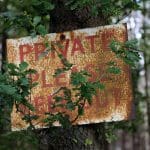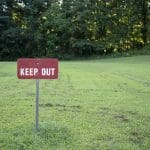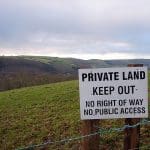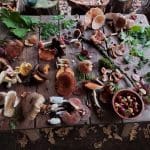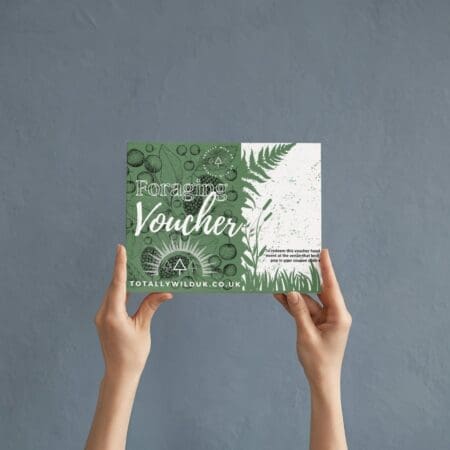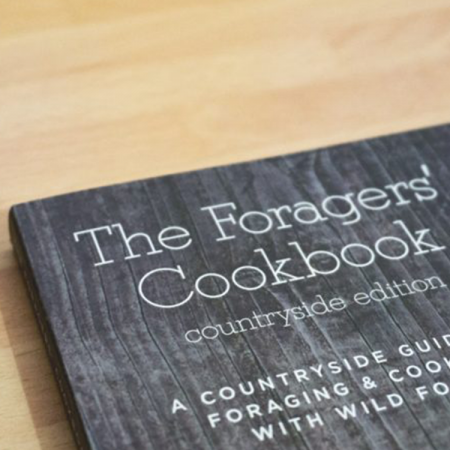Through this piece, we’re going to take a look at the question Is Foraging Legal? with some great examples, attempts and insights.
There have been a few news stories in recent years about foraging, most stories are positive but there have been a few negative ones too. Tales of Eastern European gangs stripping woods of valuable mushrooms that then appear on the menus of fancy London restaurants. The first thing to question is how true these tales are? I personally haven’t come across any of these gangs myself and most chefs wouldn’t risk their reputation buying from unregulated wholesalers. It’s normally cheaper and easier for them to import them from a reputable dealer.
In the UK one of the main points to bear in mind is what you are going to do with your finds.
If it’s for personal consumption, you don’t disturb the roots and you’re legally allowed on the land, you are breaking no rules. However, if you are planning on selling your finds things start to get a little more confusing.
Commercial harvesting without the landowners’ permission is technically illegal, but what counts as commercial harvesting? Women’s Institutes across the land collect wild fruit and berries to make jams, which are sold to raise funds for charities. Are they commercial harvesters that need to be stopped?
The Main two Laws Affect Whether Foraging is Legal
The main two laws that govern foraging are the Theft Act and the Wildlife and Countryside Act, which state;
Theft Act 1978.
(3)A person who picks mushrooms growing wild on any land, or who picks flowers, fruit or foliage from a plant growing wild on any land, does not (although not in possession of the land) steal what he picks, unless he does it for reward or for sale or other commercial purpose.
- For purposes of this subsection “mushroom” includes any fungus, and “plant” includes any shrub or tree.
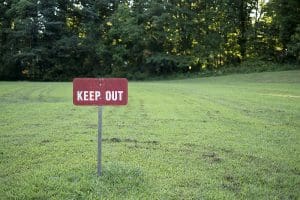
The Wildlife and Countryside Act 1981
13 Protection of wild plants.E+W
(1)Subject to the provisions of this Part, if any person—
(a)intentionally picks, uproots or destroys any wild plant included in Schedule 8; or
(b)not being an authorised person, intentionally uproots any wild plant not included in that Schedule,
he shall be guilty of an offence.
(2)Subject to the provisions of this Part, if any person—
(a)sells, offers or exposes for sale, or has in his possession or transports for the purpose of sale, any live or
dead wild plant included in Schedule 8, or any part of, or anything derived from, such a plant; or
(b)publishes or causes to be published any advertisement likely to be understood as conveying that he
buys or sells, or intends to buy or sell, any of those things,
he shall be guilty of an offence.
(3)Notwithstanding anything in subsection (1), a person shall not be guilty of an offence by reason of any
act made unlawful by that subsection if he shows that the act was an incidental result of a lawful operation
and could not reasonably have been avoided.
(4)In any proceedings for an offence under subsection (2)(a), the plant in question shall be presumed to
have been a wild plant unless the contrary is shown.
I personally always stick to the rules, most of the things that I forage are so common and can be found almost everywhere that there’s no need to break them but I thought it would be interesting to look at what can happen if you were to stray the wrong side of the law.
Examples of people who have been prosecuted for Foraging
Brigitte Tee-Hillman
In 2002 in the New Forest a local woman called Brigitte Tee-Hillman, who had been openly picking and selling wild mushrooms since the 1970s, was arrested for collecting too many trumpet chanterelles. When the case came to court she was convicted under the Theft Act because her activities were considered ‘commercial’.
She appealed and after a further 32 court hearings the case was eventually thrown out by a judge who angrily complained that his role was to try cases of grievous bodily harm, not waste public money persecuting elderly ladies for picking mushrooms.

Costs were awarded to Tee-Hillman and the land owner, the Forestry Commission (as it was named at the time) was faced with legal costs of almost £1 million. With considerable ill-grace, the Commission issued her a unique harvesting license, but it still sticks sulkily to its position that commercial mushroom picking is forbidden because it may damage fungal reproduction.
Their belief that picking mushrooms is damaging to the environment is very debatable, the only academic study in 50 years to suggest any detrimental impact from mushroom collecting, suggests this is not from harvesting as such but from footfalls damaging the delicate mycelia beneath the soil. In other words, harvesting is harmless, but activity in the woods might – theoretically – be harmful.
A a senior advisor to Natural Resources Wales stated “The evidence is very flimsy, but even if it were conclusive, this is not a route we want to go down. Logically we would have to ban all humans and exclude or cull all deer and livestock too.’
Miles Irving
Another interesting case is the Stop notice that was served to forager Miles Irving.
In August 2014 Natural England served a Stop Notice on Irving. This is a civil sanction to prevent activities that risk harming the environment. The notice claims that picking sea kale is harmful because it threatens the ability of other plants to colonise the shingle banks which give Dungeness its status as a Site of Special Scientific Interest (SSSI).
Irving appealed against the notice arguing there was a lack of scientific evidence and the list describing other plants supposedly present was inaccurate. Most importantly, he claims the notice is incompatible with both UK and EU law. Despite this, the judge ruled against him at the first hearing. Miles is now appealing but says this is mainly to maintain 800 years of common law which says that wild produce belongs to no one.
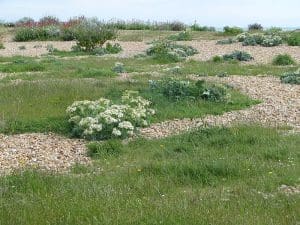
The case does, however, illustrate the legal muddle when it comes to gathering wild produce. In theory, the Wildlife and Countryside Act confers nominal ownership of plants and animals on the landowner, but the reality is more complicated. A rabbit, flower or mushroom may belong to the landowner and anyone else requires permission to remove them. But doing so is not criminal – in other words, it’s not theft. In theory, an irate landowner could sue the forager for what are effectively damages. To be successful, however, they would have to establish that they had sustained a real loss because wild fungi or fruit have a genuine value to them.
Such cases are extremely rare.
On the Flip Side
In order to make sure we don’t sway too far in one direction here I want to highlight the opposing argument around over-foraging.
We hear the stories every year around Autumn of ‘gangs’ of people heading into pristine woods and harvesting everything they see into plastic carrier bags, I’ve personally never actually seen this happen but if it did it certainly could pose an issue.
Here’s what I imagine would happen in this situation:
- A group of people not trained in fungi identification are sent through woodland and pick every single fungus they find, regardless of edibility
- They bring it back to a sorted who does know how to identify edible & none edible species
- He selects the edible species & pays the picker for the weight of that species they’ve picked
- They discard the rest.
I imagine as a land manager land owner this would be a horrific thing to see, at this point, it’s less about the law and more about the complete disregard for respecting the environment, someone would then aim to use the law to ensure this type of thing doesn’t happen again.
The other issue could be damage to other aspects of the natural environment, for example if someone was harvesting a water species plant where there were recorded great crested newts (which are protected) by harvesting they could damage the habitat for the newt – this could be similar for a multitude of species.
Conclusion
Really for me breaking the law isn’t the issue, I’m more concerned about sustainability and the impact on the environment. But done respectfully and sustainability surely it’s best to use what’s available, especially if otherwise it would go to waste. All of our food has an impact on the environment, so is it worse to forage a few plants from a private estate than to eat avocados that are imported from South America? Is picking mushrooms from a private lawn that are going to be mown away a few days later worse than eating cultivated button mushrooms? I don’t know. I really don’t think that there is an easy answer. I think that each ingredient and each site would need to be accessed individually. I think we’ll just need to be a bit more mindful about everything we consume and its origins.
Top Tips
Here’s our top tips when asking is foraging legal?
- Picking for your own consumption is fine
- Where possible talk to the land manager or owner as they have brilliant insights and can provide useful information (like don’t pick in september as we’re spraying the braken to try and control its spread and the spray may fall on to the things you’re picking)
- Pick respectfully
- Only pick what you plan to eat
- Do some research into any local by-laws on foraging
- If Foraging Commercially ensure you have land owners permission to pick & in some instances have secondary permission from natural England
References and further reading:
https://www.thelandmagazine.org.uk/articles/has-foraging-gone-too-far
https://www.dorsetecho.co.uk/news/5414806.judges-blast-as-mushroom-theft-case-is-dropped/



